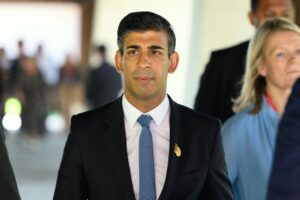Sunak offers 6% pay rise to millions of public sector workers

<?xml encoding=”utf-8″ ?????????>
Millions of public sector workers will be given a pay rise of at least 6%, but government departments have been told to fund the rise from within existing budgets.
Police officers, junior doctors and teachers in England are among those who would benefit after Rishi Sunak accepted all the recommendations of the independent pay review bodies.
The Treasury has ordered a range of measures for Whitehall departments to “reprioritise” their budgets.
The highest pay rise, 7%, will go to police officers, funded partly by the Home Office increasing the cost of work and study visas.
While millions will be offered at least 6%, others will not. A reduction in hiring civil servants in the Ministry of Defence until 2025 will be used to meet a 5% pay boost for armed forces personnel.
The immigration health surcharge, a fee for foreigners to access the NHS, will be put up to foot the bill for the extra 6% pay for junior doctors.
The Treasury minister John Glen said the education department’s budget would be altered to give teachers a 6.5% boost. He said frontline services would be protected and that £525m would be set aside in the current financial year, with a further £900m to follow next year.
Given senior government figures have raised concerns that boosting public sector pay may prolong stubbornly high inflation, Glen stressed in a statement to parliament on Thursday that the pay awards were “responsible”.
He argued that the amounts would not fuel inflation and reflected the government’s desire to respect the pay review bodies and were “because we’re proud of our world-class public servants”.
Inflation stood at 8.7% in May, and core inflation rose by 7.1% over the previous 12 months – the highest in 30 years.
The Treasury has erred against further borrowing, and Glen said it was “not fair or affordable” to give pay awards stretching into the double digits.
Pay awards worth 3.5% had been budgeted for, meaning the total amount that government departments will need to make up or find efficiencies to reduce costs for is between £3bn and £5bn.
Teaching unions welcomed the pay award. In a joint statement, they said they would put it to members with a recommendation to accept and it would “allow teachers and school leaders to call off strike action”.
In welcome news for No 10, the leaders of the National Education Union, Association of School and College Leaders, National Association of Head Teachers and NASUWT said they hoped to “resume normal relations with government”.
Earlier this week, Jeremy Hunt said delivering “sound money” was the government’s number one focus. In a Mansion House speech, the chancellor said: “That means taking responsible decisions on public finances, including public sector pay, because more borrowing is itself inflationary.
“It means recognising that bringing down inflation puts more money into people’s pockets than any tax cut. And it means recognising that there can be no sustainable growth without eliminating the inflation that deters investment and erodes consumer confidence.”
Sunak was similarly strict about not adding more to the national debt when he was asked about the decision on public sector pay earlier this week.
Speaking at the Nato summit in Lithuania on Wednesday, the prime minister said: “Everyone knows the economic context we are in and we need to make sure that government decisions, particularly when it comes to not borrowing more, are made responsibly so we don’t fuel inflation, make it worse or last for longer.”




